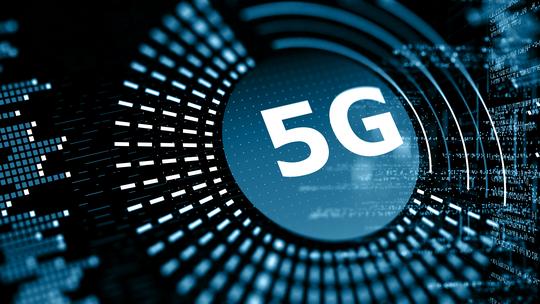
Top industries in Georgia are poised to benefit from 5G, the next innovation in the wireless communications industry that's set to roll out over the next decade.
It could add $44.3 billion to the Georgia economy, according to a report from the Cellular Telecommunications Industry Association and the Boston Consulting Group. That means job and GDP growth in industries such as manufacturing, technology, healthcare and e-commerce, all growing sectors in the local economy.
The network, an upgrade from current 4G capabilities, enables machine-to-machine communication and reliable, low-latency communication, said Matthieu Bloch, a wireless communications expert at Georgia Tech. That means people can control robots or other objects remotely with real-time responsiveness that’s faster than 4G.
The 10-year rollout is based on the time it took other generations of wireless connectivity to become widespread.
Effects on industry
In the coming years, it's the manufacturing industry that could see the highest number of jobs created -— at 380,000 — across the country because of 5G, according to the CTIA report.
“5G enables manufacturing to have automation and robotics,” said Nick Ludlum, CTIA chief communications officer. “Those different sets of technologies require different sets of skills.”
Georgia has a strong manufacturing sector, mostly in machinery, electrical equipment and metal, producing a $61.1 billion output with 270,000 workers, according to the Georgia Department of Economic Development. The new connectivity could reinvent that industry.
Information services and technology are also expected to grow by 205,000 jobs and $217 billion nationwide, according to the report. As Atlanta emerges as a nationally recognized tech hub because of new corporate tech tenants and a strengthening startup ecosystem, 5G could spawn new, high-growth companies.
This is possible as many of the applications of 5G may not have been realized yet, Bloch said. The adoption of 4G technology saw the creation of now commonly used apps, such as rideshare and food delivery, which were not possible or conceived before 4G.
The healthcare sector is another that could see advancement from 5G. Atlanta is widely considered "the capital of public health" because of Emory University and its network of healthcare systems, but rural Georgia hospitals have faced years of closures, according to the Atlanta Journal-Constitution, creating a lack of access to healthcare in some parts of the state.
With 5G a doctor could conduct remote surgery by wirelessly connecting to a robot that responds instantaneously to their signals, Bloch said.
As a hub for logistics that's already enjoying benefits from the e-commerce boom caused by the pandemic, 5G capabilities could make the city's supply chain sector even more efficient, such as enabling more drone uses for transporting goods, according to the report.
Some phones already have 5G capabilities, which essentially allows them to have faster speeds and doesn’t feel much different from 4G. It’s 5G’s physical world applications that will be game changing, Bloch said, which would also require hardware innovations before coming to fruition.
Prepping for new connectivity
New infrastructure and skills are necessary to realize the potential of 5G, according to the CTIA report.
Schools and job training programs should add more engineering and software development courses to prepare a workforce for the new types of jobs that will become available, Ludlum said.
It also enables autonomous vehicles and “smart city” monitoring, such as showing when infrastructure needs to be repaired.
“One of the really basic things that enables truly smart cities are having 5G sensors pretty much everywhere,” said Ludlum, which could monitor traffic patterns, air quality or other data.
Technology jobs are already in high demand. As 5G rolls out, demand for technology jobs could jump higher. That includes more cybersecurity roles, Bloch said, which currently has a huge talent gap. In Georgia, more than half of the available cybersecurity roles are unfilled, according to Cyberseek, which tracks the industry’s job market.
The state is set to gain 114,000 jobs overall by 2030 because of 5G, according to the report, but it doesn’t consider jobs lost because of automation or robotics, Ludlum said.
To get an accurate job count over the next 10 years, Bloch says people will have to look at the net number of jobs created after some are lost when 5G is implemented.
“Because 5G is a lot more connected to the physical world and not just the cyber world, the expectation is a lot of jobs will still be created,” Bloch said.
Regulatory frameworks also need to keep up with the technology before it can become mainstream, Bloch said. He sees specialized verticals, such as agriculture or telemedicine, gaining 5G capabilities before more universal uses, such as autonomous vehicles.
The state is also already hosting programs researching innovative uses of this wireless technology.
The Georgia Tech Research Institute is working on projects about how to use 5G to optimize Georgia’s agricultural industry, Bloch said. The new connectivity could be used to monitor the health and growing patterns of crops.
The Curiosity Lab at Peachtree Corners, the economic development arm for that city, allows companies to test 5G technologies at its facilities through a partnership with Sprint, which is owned by T-Mobile.
Sprint’s “Curiosity IoT” platform supports artificial intelligence, robotics, edge computing, autonomous vehicles and other systems made possible by 5G, according to the Curiosity Lab website.
The nation is two years into its 5G rollout, Ludlum said, and there are three nationwide 5G networks right now — Verizon, AT&T Communications LLC and T-Mobile Inc.







